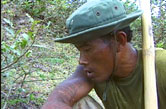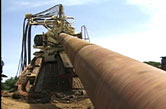By Richard Behar
August 1, 2002

A Cambodian woman employed on Alcatel’s cable-laying operation. |
Where’s the line?
If the great globalization debate were boiled down to one question, it would be this: “Where’s the line between fairness to and exploitation of poor workers by the world’s multinationals?”
On one side of the debate sit people like Laurent De Segonzac, spokesman for Alcatel — the French telecom giant that has used hundreds of rural Cambodian villagers to dig through rock and dirt (and past unexploded landmines) to lay broadband cable across the country. For this they received less than $1 a day — the official line of absolute poverty.
“You can’t be deciding if a wage is acceptable through the eyes of a Westerner,” says De Segonzac. “It’s not acceptable to us, but it is to them.” Many of those diggers might beg to disagree with Alcatel.
Then again, “Let Them Sweat,” writes NEW YORK TIMES columnist Nick Kristof. He calls on G-8 leaders to promote garments from third-world factories, with labels reading, “Proudly Made In A Third World Sweatshop.” As Kristof sees it, sweatshops are the best and only option that the poorest workers have in places like Cambodia and Afghanistan. He’s right. And he’s wrong.
“It’s very easy for everyone to justify paying people peanuts, because peanuts are better than nothing,” says Brad Adams, who worked as a human rights lawyer for the UN in Cambodia in the 1990s. “They make it sound like they’re philanthropists for giving people jobs in sweatshops. It’s very hard to know where the balance is, where the line is. But it’s very easy to exploit people there.”
Alcatel’s $10 million Cambodian fiber-optic project — financed entirely with a grant from the German government — was completed in a “record time” of 15 months in June 1999, according to spokesman De Segonzac. He calls the project a “major achievement,” considering all the adverse conditions — heavy flooding, the need for military protection against the Khmer threat, the government’s requirement that local workers be used, and the problem of landmines. (Cambodia has the world’s highest percentage of landmine amputees.)
De Segonzac concedes that the use of powered machinery would have made the project “much faster and less painful” for the estimated 500-plus workers, but that such machinery could have more easily caused the landmines to explode. Perhaps. (Other experts say that sophisticated detectors could have been used before bringing in truck plows.)
In fact, “in the absence of international rules,” says De Segonzac, Alcatel had “little influence” on the wages of workers or the operations of its subcontractors. Workers were paid roughly 60 cents per meter (40 inches) of cable — dug and laid — for a total of about $500,000, or just 5 percent of the value of the Alcatel contract.
Alcatel says it repeatedly tried to halt the use of child labor, but that extra income was needed by nomadic families that traveled along the path of the cable. “The father or mother were momentarily replaced by adolescent children,” says De Segonzac.
Finally, only those directly employed by Alcatel received medical assistance, sick leave and benefits from the company. In conclusion, says De Segonzac, “the extreme conditions have led Alcatel to reinforce its ethical code of conduct” with regard to subcontractors.
So where is it? Where is that line?
“It’s one of those questions that is so enticing and so impossible to answer,” says Mike Allen, a director of Global Alliance, a partnership between the World Bank and two multinationals (Nike and the Gap) that monitors Asian garment factories. “There are still large waves of sectors not producing for the major brands where there are no monitors. The companies say they have codes of conduct, but most are pretty minimalist — the minimum wage and minimal safety standards. Their monitors have a clipboard-checklist approach — parachuting into a factory for a day and then getting airlifted out.”
But there are big changes afoot. Globalization itself is shrinking the world, making it harder for multinationals and foreign governments to operate in the shadows. Meanwhile, things like campus protests, boycotts and congressional sanctions are taking a backseat to U.S. courtrooms, where a growing number of cases may force multinationals to figure out where the line is — and quickly.
Exxon is being sued for abuses by state security forces used to protect the firm’s gas fields in Indonesia. Similarly, in May, a federal court accepted a case brought by 30,000 foreign workers alleging that the U.S. apparel industry — Gap, Levi Strauss, J.C. Penney, among others — operated as a “criminal enterprise” by conspiring with corrupt and brutal contractors on the island of Saipan.
In June, a new legal concept called “vicarious liability” reared its head, when a California judge ordered Unocal, the oil giant, to stand trial for allegations by foreign workers that they were kidnapped, raped, and/or forced to perform hard labor against their will on a pipeline in Burma.
The main reason that workers are turning to U.S. courts is that corruption has rendered their own legal systems virtually useless.
Corruption has become a key political theme all across Southeast Asia. And Cambodia is the worst of the lot: Three decades of war and civil strife, a 40-percent poverty rate, and a corrupt government that seized power in a bloody coup in 1997. In the 1970s the Khmer Rouge regime’s genocidal “social policies” reduced the Cambodian population by a number variously estimated at between 1.5 million and more than 2 million — as much as one-quarter of Cambodia’s then population — including most of the judges, lawyers, teachers and doctors. American historian David Chandler uses words like “traumatized,” “broken,” and “still stunned” to describe Cambodia. Indeed, last year only 25,000 students (out of a population of 12 million) were enrolled in the higher-education system.
Corruption surveys in Cambodia’s demoralized society are off the charts. In a World Bank survey two years ago, foreign enterprises complained that 68 percent of their contacts required the paying of bribes. By all accounts, the situation today is even worse. “You can’t get [business] licenses in Cambodia today without paying senior government officials,” says ex-UN lawyer Adams.
Corruption is now at the heart of one of Cambodia’s biggest business scandals, a scandal — incidentally — that involves an Alcatel partner.
Two years ago, Alcatel was awarded a $63 million government contract to install a mobile phone network. Alcatel sold the phones and equipment to Cambodia’s Mobitel, a joint venture involving Sweden’s largest telecom firm. Mobitel quickly grew to become Cambodia’s number-one carrier. But last year, the country’s public works and communications minister, So Khun, confessed in a parliamentary hearing that he was also serving as an “advisor” to Mobitel for $2,500 per month — several times his official salary.
Although he ended the arrangement immediately, the minister hasn’t lost his post. The same can’t be said for Son Chhay, a member of Cambodia’s parliament. After protesting to Swedish authorities about the Mobitel deal, he was fired as chairman of the industry’s parliamentary oversight committee. “This case was the first of its kind to have official proof [of corruption], but parliament and the government refused to do anything,” says Chhay today. In a June 28 letter to the speaker of Sweden’s parliament, Chhay added: “We still do not have laws, let alone an institution, to help stop such crimes and to date no one has ever been convicted of corruption.”
And so the question arises again: Where is that line between fairness and exploitation? Chhay is still waiting for his answer.
Richard Behar is a Senior Writer for FORTUNE magazine, specializing in investigations. His work for FORTUNE, TIME and CNN has garnered him 15 major journalism awards, including the Gerald Loeb, the Polk and the National Magazine Award. For more of Behar’s work on the dark side of globalization see the following stories at Fortune.com: “The Year of Laying Cable Dangerously” (Indonesia), “Kidnapped Nation” (Pakistan), “Beijing’s Phony War On Fakes,” and “The Karachi Connection: bin Laden’s Terror Engineer.”


